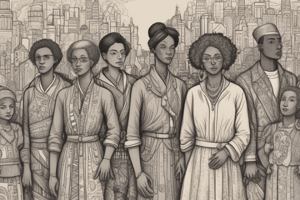Podcast
Questions and Answers
What is the primary focus of racial justice?
What is the primary focus of racial justice?
- Addressing past and ongoing racial injustices and advocating for systemic change. (correct)
- Achieving equal treatment in various sectors regardless of racial identity.
- Minimizing the impact of race on social and economic outcomes.
- Implementing policies to increase representation in organizations.
Which of the following best defines racial equity?
Which of the following best defines racial equity?
- The legal framework that ensures equal rights for all individuals.
- A condition where societal treatment varies by racial identity.
- The elimination of all forms of discrimination.
- A system in which equitable opportunities are available for all, regardless of race. (correct)
Which approach primarily addresses existing disparities and barriers faced by different racial groups?
Which approach primarily addresses existing disparities and barriers faced by different racial groups?
- Racial integration.
- Racial equality.
- Racial justice.
- Racial equity. (correct)
What does racial justice aim to achieve?
What does racial justice aim to achieve?
How does racial equity differ from racial justice?
How does racial equity differ from racial justice?
What is a key outcome of achieving racial equity?
What is a key outcome of achieving racial equity?
Why is activism important in the context of racial justice?
Why is activism important in the context of racial justice?
What does the term 'systemic racism' refer to in the context of racial justice?
What does the term 'systemic racism' refer to in the context of racial justice?
What was the primary goal of the Reconstruction era after the Civil War?
What was the primary goal of the Reconstruction era after the Civil War?
Which legislation aimed to dismantle institutional racism and protect the rights of Black Americans?
Which legislation aimed to dismantle institutional racism and protect the rights of Black Americans?
What was a major consequence of redlining in Black communities?
What was a major consequence of redlining in Black communities?
How did the 'War on Drugs' policies affect Black individuals in the late 20th century?
How did the 'War on Drugs' policies affect Black individuals in the late 20th century?
What does systemic racism refer to?
What does systemic racism refer to?
Which movement has recently highlighted racial inequities and police brutality?
Which movement has recently highlighted racial inequities and police brutality?
Which aspect of society is NOT typically affected by implicit bias?
Which aspect of society is NOT typically affected by implicit bias?
What is necessary to address ongoing racial inequities in society?
What is necessary to address ongoing racial inequities in society?
What is the primary goal of racial justice?
What is the primary goal of racial justice?
How does racial equity differ from racial justice?
How does racial equity differ from racial justice?
What common goal does the racial equity and inclusion profession share?
What common goal does the racial equity and inclusion profession share?
Which of the following actions aims to achieve racial equity?
Which of the following actions aims to achieve racial equity?
What historical context is essential in understanding current racial inequities?
What historical context is essential in understanding current racial inequities?
What characterized the institution of slavery in the United States?
What characterized the institution of slavery in the United States?
What does the three-fifths compromise in the Constitution signify?
What does the three-fifths compromise in the Constitution signify?
Which of the following best describes the importance of cultural diversity in the context of racial equity?
Which of the following best describes the importance of cultural diversity in the context of racial equity?
In what way is the racial equity profession pivotal in shaping organizations?
In what way is the racial equity profession pivotal in shaping organizations?
What is a key strategy utilized by professionals in the field of racial equity?
What is a key strategy utilized by professionals in the field of racial equity?
Why is recognizing historical context essential in analyzing current racial practices?
Why is recognizing historical context essential in analyzing current racial practices?
What is a significant barrier to achieving racial equity?
What is a significant barrier to achieving racial equity?
What role do subtle forms of bias play in the pursuit of racial equity?
What role do subtle forms of bias play in the pursuit of racial equity?
What is a primary aim of initiatives for racial equity and inclusion?
What is a primary aim of initiatives for racial equity and inclusion?
Flashcards are hidden until you start studying
Study Notes
Racial Terminology
- Racial Equity: Condition where one’s racial identity does not influence societal outcomes; aims for fair access to resources and opportunities for all races.
- Racial Equality: Equal treatment of all individuals regardless of race, focusing on equal rights and non-discrimination.
- Racial Justice: Goal of achieving fairness and equal rights for all; emphasizes correcting systemic racism and advocating for change.
Differences Between Racial Equity and Racial Justice
- Focus:
- Racial justice targets the root causes of inequities, aiming to transform societal norms and power structures.
- Racial equity seeks to eliminate disparities and ensure fair treatment and outcomes for all races.
- Approach:
- Racial justice involves advocacy, activism, and legal reforms.
- Racial equity requires policy changes and support tailored to diverse needs for equal outcomes.
Historical Context of Racial Disparities
- Colonialism and Slavery: European colonization and the transatlantic slave trade led to the exploitation of indigenous peoples and Africans.
- Institutional Racism: Slavery was entrenched in the U.S. economy, denying basic rights and legalizing racial disparities, exemplified by the three-fifths compromise.
- Post-Civil War Era: Reconstruction aimed for civil rights but was undermined by Jim Crow laws enforcing segregation and discrimination.
- Civil Rights Movement: A pivotal period in the mid-20th century sought to challenge racial injustices and resulted in landmark legislation like the Civil Rights Act of 1964.
- Contemporary Inequities: Racial disparities continue in housing, education, and employment; practices like redlining have had long-lasting effects.
- Mass Incarceration: Policies such as the "War on Drugs" disproportionately affected Black communities, leading to escalated incarceration rates.
- Systemic Racism and Implicit Bias: Deeply rooted biases within institutions perpetuate racial inequities; implicit biases influence decisions across societal sectors.
- Ongoing Activism: Movements like Black Lives Matter highlight the need to address racial disparities, police brutality, and systemic reforms.
Professional Goals in Racial Equity and Inclusion
- Aim: Dismantle barriers preventing marginalized racial and ethnic groups from participating fully in society.
- Practices: Involves advocacy, policy change, community outreach, and education to foster inclusive environments.
- Key Principles: Understanding identity, power, and privilege is crucial in combating systemic inequities.
- Challenges and Opportunities: Diversity practitioners face obstacles but also have the potential to innovate and promote equitable practices in various sectors.
Studying That Suits You
Use AI to generate personalized quizzes and flashcards to suit your learning preferences.




